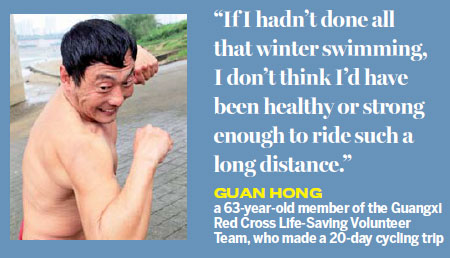Cold hobby, warm hearts
Updated: 2016-04-15 08:54
By Ren Qi and Huo Yan in Nanning(China Daily Europe)
|
|||||||||
Winter swimmers work as volunteer lifeguards to prevent tragedies in Yongjiang River
The date July 13, 2010, is forever etched in the memory of Guo Huiren.
It was the day five boys, two of whom were twins, drowned while swimming in the Yongjiang River in the southern city of Nanning.
"I'll never forget it," the 62-year-old says of the event, which inspired him to launch a volunteer lifeguard service three days later with friends from the local winter-swimming club, in the hope of preventing similar tragedies.
Guangxi Red Cross Life-Saving Volunteer Team started with just 10 members. Today, it has more than 70, mostly retirees in their 60s.
"All the lifeguards are volunteers, and we're all experienced swimmers," says Ou Jian, the team's captain. "Ten of us have received official lifeguard certificates from the local government. Almost everyone on the team has saved people more than once."
Guo, one of its most skilled swimmers, has rescued about 30 people. However, this dates back to before the group started; he says his first was in 1983, when he helped save a woman who attempted suicide by jumping into the river.
He explains that most incidents involve young people or those unfamiliar with the river and its currents.
"The deepest part of the swimming area in Yongjiang River is more than 20 meters, but near the riverbank it is only 1 meter. This means it is very dangerous for outsiders, who swim too near to undercurrents, get pulled out and suddenly find they don't have the strength to swim back to the bank."
Volunteers keep watch during the day and late into the evening, when swimming becomes even more hazardous.
"We don't have statistics on the number of people we've rescued," Ou says, "but we're ready to give a hand whenever anyone needs help."
The team does not currently receive financial support from the local government or any enterprises, with members raising their own funds. Also, despite including the Red Cross in its name, it is not officially affiliated with the humanitarian organization.
"Our group runs independently, but we are verified by the Red Cross Society and it has provided lots of support to us, such as offering training programs (for volunteers)," Guo says.
In addition to providing a lifeguard service, the team also promotes safety knowledge. Members organize free lessons on the riverbank for young people to learn first aid skills, as well as go into schools and community centers to offer advice on how to stay safe in and around waterways.
Guo says most local people who swim in Yongjiang River now regularly use flotation devices, such as life buoys.
"We call them tagalongs. If the swimmers encounter a dangerous situation, a tagalong can help them survive it," he says. "We teach people useful tricks like this, and more importantly we teach them to not panic, stay calm and maintain the correct position when facing danger."
Yongjiang River, which runs through the center of Nanning, capital of the Guangxi Zhuang autonomous region, is a popular swimming spot among residents, especially in the colder months.
Winter swimming has been growing in popularity along the 133-kilometer waterway ever since the late Chairman Mao Zedong took a dip in January 1958 during a Communist Party of China meeting in Nanning.
The activity reached a peak during the "cultural revolution" (1966-76), when the local government organized winter-swimming contests.
Guan Hong started swimming in the river in 1993 at the behest of his father.
"He was seriously ill at the time and I swam only occasionally. Before he passed away, he persuaded me to swim every day, saying that staying healthy was the most important thing in life," he says.
The 63-year-old is a member of the Guangxi Red Cross Life-Saving Volunteer Team and is among those to have received an official certificate from the regional government.
He believes winter swimming is good for the heart and vital capacity - and to prove his point he says that, in 2006, after retiring, he cycled from Nanning to the northernmost part of the Inner Mongolia autonomous region, the birthplace of his parents.
"The whole trip lasted more than 20 days," Guan says. "When I reached my hometown, all my relatives were astonished. If I hadn't done all that winter swimming, I don't think I'd have been healthy or strong enough to ride such a long distance."
Zhao Quan, 78, who has been swimming in the Yongjiang River since the 1960s, adds: "Winter swimming is more than just a sport to Nanning people."
Contact the writers through renqi@chinadaily.com.cn

Today's Top News
Passage to piraeus
In the hall of the great frescoes
World Bank joins AIIB on financing for joint projects
GM seeds to get oversight
Russia-China ties benefit both countries, peoples
China, UK showcase best books in London
Hello, China! Stephen Hawking debuts Weibo account
Manila set to restart revamp of airport in S China Sea
Hot Topics
Lunar probe , China growth forecasts, Emission rules get tougher, China seen through 'colored lens', International board,
Editor's Picks

|

|

|

|

|

|







